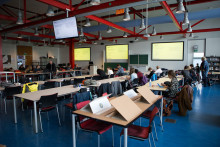At the beginning of 2020 protest movement WOinActie, along with trade unions AOb and FNV, went to the Labour Inspectorate. They filed more than 700 reports of ‘structural overtime’ at universities. The Labour Inspectorate instituted an investigation into ‘psychosocial work factors’. They included in it previous signals of misconduct and intimidation in the academic world.
Treating symptoms
The many plans to tackle the workload are unlikely to be sufficient; that was the conclusion that was reached in the summer. They focus too much on individuals, while the source of the problems is not dealt with. The inspectorate talked of the risk of merely ‘treating the symptoms’.
The universities themselves consider underfunding by the ministry and the shortage of research grants to be substantial causes. But the inspectorate takes the view that too few changes were undertaken by the universities themselves.
Inappropriate behaviour
Another point of criticism was that the universities pay too little attention to inappropriate behaviour and discrimination. It is often unclear who is responsible for tackling them and is authorised to do so. The aftercare for victims also seems to be inadequate.
Outgoing Minister Van Engelshoven now concludes that the universities’ personnel policy needs to be improved. She wants to enter into discussions with them on topics such as the academic working culture, the large number of temporary contracts and other undesirable incentives in the system.
New government
Referring to research by PwC and the Weckhuysen committee, she acknowledges that the extra funding requested by the universities is necessary if the problems relating to workload, stress and the number of applications are to be reduced. But she is leaving decisions on that to a new government.
In line with the Labour Inspectorate, she stresses that extra funding alone is insufficient. ‘Also within budgetary limits there must be a sound approach to workload and work-related stress, in a safe environment without any risk of discrimination and intimidation.’
Large numbers of applications
Van Engelshoven also responded to a plan of action from research funding body the Dutch Research Council (NWO) and the Association of Universities in the Netherlands (VSNU) to reduce the number of applications from researchers, and thereby the workload. She regards the measures taken as ‘initial steps that deserve a robust follow-up.’






